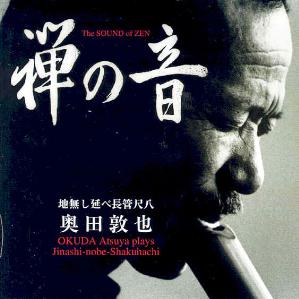
The Sound of Zen
Encyclopedia

Shakuhachi
The is a Japanese end-blown flute. It is traditionally made of bamboo, but versions now exist in ABS and hardwoods. It was used by the monks of the Fuke school of Zen Buddhism in the practice of...
album by Atsuya Okuda
Atsuya Okuda
Atsuya Okuda is a Japanese-born master teacher and craftsman of the jinashi shakuhachi, an unrefined bamboo flute. Prior to dedicating his efforts to the bamboo flute, he was a professional jazz trumpet player from approximately 1965 until 1985.Since the death of Watazumi Doso in 1992, some regard...
. The album contains recordings of six honkyoku
Honkyoku
Honkyoku are the pieces of shakuhachi or hocchiku music played by mendicant Japanese Zen monks called komusō. Komusō played honkyoku for enlightenment and alms as early as the 13th century. Honkyoku is the practice of suizen...
, the music of Japan
Japan
Japan is an island nation in East Asia. Located in the Pacific Ocean, it lies to the east of the Sea of Japan, China, North Korea, South Korea and Russia, stretching from the Sea of Okhotsk in the north to the East China Sea and Taiwan in the south...
ese Zen
Zen
Zen is a school of Mahāyāna Buddhism founded by the Buddhist monk Bodhidharma. The word Zen is from the Japanese pronunciation of the Chinese word Chán , which in turn is derived from the Sanskrit word dhyāna, which can be approximately translated as "meditation" or "meditative state."Zen...
monks, played by Okuda.
Okuda has played shakuhachi since 1985 but until this album he refused to record his playing, believing that only live sound leads to an understanding of jinashi shakuhachi. The CD was published by S-Two Corporation.
Tracks
- Honte Shirabe (本手調子), 4 minutes 56 seconds
- Tsuru no Sugomori (鶴の巣籠), 9 minutes 52 seconds
- Shin Kyorei (真虚霊), 12 minutes 3 seconds
- Ôshû Sashi (奥州薩字), 7 minutes 40 seconds
- Tamuke (手向), 5 minutes 53 seconds
- Kokû (虚空), 17 minutes 9 seconds

